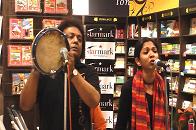
Download That’s the sound of one of the most popular youth bands in Bangladesh, called Bangla.
More than any other band, it has popularized the music and ideas of the Baul mystic minstrels of rural Bangladesh.
Anushe Anadil the group’s lead vocalist was brought up in a family dominated by high brow Bengali culture.
David Bergman asked her how she has ended up singing rural songs.
“I think one of the things I had realised as a child. There are two cultures which exist in Bangladesh, one is a very rural culture which is raw and has a beauty of its own, and a very urban culture which is refined and the two can’t really relate to each other. So, we don't understand them. They don't understand us. So there were two distinctly separate cultures co-existing in the country, so obviously there was a division, I thought, as a child growing up.”
It is this division that Anushe, has tried to bridge through her music.
Her music has popularized the songs of Bengali’s rural mystic minstrels, known as bauls.
“One of the thing that attracted me towards the bawls is the rawness. It was Kangalini Sufyan, she sung I must have been 12 or 13 years old and I remember her singing and she sung it was just like she got transformed, and something else came out through her, it was not her any more. And me growing up listening to such great artists with such refined voices, doing the perfect notes I don't think I had ever heard that sort of a spirit coming out of a song. So I think that is what my search for the baul. I want to look for that or that, that spirit, I want the sprirt in me. I want that spirit to shine through me as well.”
For Anushe, the Baul music should be a source of national pride.
“Our generation, just previous to this one, we grew up not even finding any pride for our country but to find such a strong hidden treasure in Bangladesh,was a gift for me, it was magic for me, it was a transformation. With all the traffic jam, and all the corruption, and all this crap that keeps on happening with this country, there still lies this absolute magic.”
“Every time you step out of Dhaka and you are singing and you actually see all these people who we call so called mullas, with beard and who we call extremists, they dance. Bangladesh for me is this Bangladesh, not the Bangladesh that the whole world portrays it to be. They want us to remain stupid. They want us to remain a backward country with an overdose of negativity. So I think our point is to remove all that negativity, to expose the positivity.”
The baul movement reflects a long heritage in Bengal of preaching mysticism through songs.
It reached its peak in the 19th and early 20th centuries – but now the numbers of actual bauls are few, though its music is spreading.
The Baul philosophy melds together different aspects of Hinduism, Buddhism and Sufism.
“The main philosophy is that the most important thing to be is to be in the present and to get to know my body. My body is like a projector which is projecting this image of the world and which I am seeing at all times and so when you are aware of your body, then you are aware of the universe. And so I think that is the philosophy of the bowls, that there is no really big divine thing there, there is, because is it is in your consciousness, it is about emancipating yourself from mental slavery like Bob Marley had said. You know, every revolution is not outside, it is in my mind.”
"There is a song that translates almost like Imagine, John Lenin’s imagine. When will a society like this exist when there are no castes and creed. There is no Hindu, there is no Muslim, there is no upper class, there is no lower class when will such a society come into being.”
Her Band, Bangla, started in 1988.
“When we started our band, had no idea what we were doing, we were just expressing ourself, and in the process what ended up happening is something completely new, which is a bowel music in the perspective of an urbaner. For me or my band members who grow up in Dhaka. For me to express my feeling, it not possible for me to express myself with a flute or dui tara because I do grow up in like a traffic jam and a mobile phone and there is so much noise we do need the distortion guitar to express the feeling. And I think that when we translate it like this, it automatically goes and reaches the young urbaners like ourselves because it is the expression of the Bangladeshi youth."
And the band became an overnight sensation.
Whilst its music is thought of as experimental, it has a huge fan base. The band now do not take part in many concerts, but their albums are very popular.
“The young were actually thirsty for something which they could identify with, and also something that was also something new, and something that they could feel pride about. Every time I sing or go out I really realize that our youth is really thirsty, they want change, they want any sort of change, and anything you give them why will hold onto and grab onto it. It does not have to be anything fascinating and absolutely fantastic. The band music of Bangladesh did not speak anything bengali. There was nothing bengali about it before our band. It was very much a rock bank, singing a rock song, with the same rock melodoy. So I think the concept of bringing the baul songs into band that was something new.”
I ask her what is the song that the fans always want her to sing.
“There is one which is not actually a baul song, but is a song which is baul inspired. There are so many me’s living in me, there is one me who creates, and another me who comes and destroys, one me who is great at messing everything up and there who holds the awe and somehow takes me in front.”














